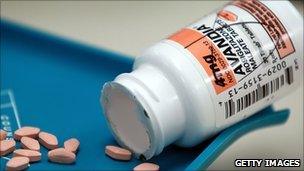GlaxoSmithKline profits weighed down by Avandia ban
- Published

Sales of Avandia were banned in Europe because of a suspected link to heart disease
GlaxoSmithKline has announced third quarter profits weighed down by the European ban of diabetes drug Avandia and falling demand for flu vaccines.
The company made £1.29bn ($2bn) in the period, down 3.5% from a year ago.
Sales fell 2% versus a year earlier, but were up 2% if Avandia and pandemic drug sales are excluded, the firm said.
European regulators banned the diabetes drug in September, while sales in the US have also been restricted, because of a suspected link to heart disease.
Sales of Glaxo's herpes drug, Valtrez, were also hurt by growing competition from similar generic rival products after its patent expired, according to the drugmaker's results, external.
Although a fall in sales was anticipated by most analysts, the figures nonetheless disappointed markets, with Glaxo's share price falling more than 2% on the news.
Chief executive Andrew Witty blamed US healthcare reform and European austerity measures for the poor performance.
"Despite the challenging environment we face, I remain confident that [Glaxo]'s outlook continues to improve," said Mr Witty.
The disappointing results follow on from a second quarter in which Glaxo recorded a loss due to one-off charges for restructuring costs as well as legal costs associated with Avandia among others.
- Published1 July 2010